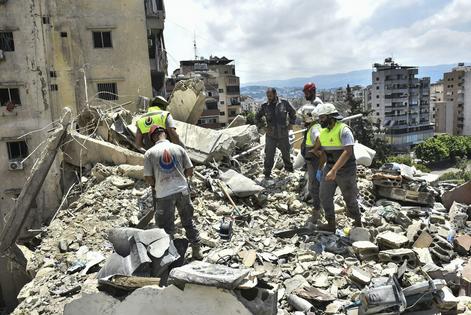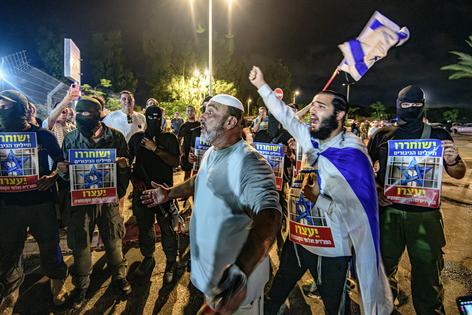With Hezbollah and Hamas assassinations, Netanyahu shows willingness to risk regional war for political survival
Published in Political News
Israel’s apparent assassinations of Fuad Shukr, Hezbollah’s top military leader, in Beirut, and Hamas political leader Ismail Haniyeh, in Tehran, have raised again the specter of a regional war involving regional adversaries – one that could potentially drag the United States into the fray.
By targeting these two leaders, the Israeli government has demonstrated that it is willing to risk an escalation of conflict into new fronts. This comes despite some senior defense chiefs sending, at best, conflicting messages in recent months over whether the Israeli Defense Forces are adequately prepared, after nine months of confrontation in Gaza, for a full-scale war in Lebanon or elsewhere.
As a scholar of Lebanon and Israel, I have followed the recent events in the region with growing concern. Israeli Prime Minister Benjamin Netanyahu may be betting that Iran and Hezbollah have no real appetite for full-scale war and would rather continue a policy of continued attrition against Israel.
If so, it is a risky strategy, and any miscalculation could be catastrophic.
Shukr was assassinated as part of the tit-for-tat exchanges between Israel and Hezbollah that have been going on since Oct. 8, the day after Hamas terrorists attacked Israel, prompting the heavy and ongoing response in Gaza. In particular, it was in retaliation for the killing of 12 children on July 28, 2024, in the Israeli-controlled Golan Heights, blamed on Hezbollah.
The Beirut killing was a bold and risky move by Israel, carried out in broad daylight in the city despite repeated requests by the U.S. and other Western countries not to target Lebanon’s capital.
In carrying through with the Beirut operation, Israel has pushed the limits of the “rules of the game” in its post-Oct. 7 war of attrition with Hezbollah. Until now, the Lebanese capital was targeted only once by Israel with the Jan. 2, 2024, assassination of Saleh Arouri, another Hamas leader, not far from where Shukr was killed.
Back then, it was assumed that Hezbollah would not escalate the conflict for the sake of the death of a Palestinian leader, important as he may have been.
But there is little doubt that Hezbollah will respond to this new attack; the questions are how and when, and whether its response will bring the adversaries another step closer to a full war.
The assassination of Haniyeh in Tehran was done in the context of Israel’s declared commitment to kill all Hamas leaders involved in the Oct. 7 massacre, although the country has not officially claimed responsibility for the strike, as is its usual practice.
Israel reportedly guaranteed Qatar, Haniyeh’s host country, that it would not target Hamas leaders within its borders. Israel also chose not to kill him during Haniyeh’s recent visit to Turkey, potentially out of concern of further alienating Turkish President Recep Tayyip Erdoğan.
Instead, it appears Israel waited for the right opportunity at a different spot that would send a clear message, not only to Hamas but more broadly to Israel’s main regional adversary, and Hamas’ main sponsor, Iran.
Haniyeh’s killing in Tehran puts the Iranian regime in an embarrassing position. The strike by a foreign country openly violated Iran’s sovereignty at the time when the regime was preparing to celebrate the appointment of a new president. The Hamas chief was among international dignitaries invited to the inauguration.
The attack demonstrates two things: Iran’s vulnerability and Israel’s ability to carry out an attack based on precise intelligence and superior technology. Either way, it exposes the Iranian regime’s weaknesses.
The last time Iran claimed its sovereignty was violated by Israel – during the April 1, 2024, attack on its embassy in Damascus – it responded by launching hundreds of missiles and attack drones against Israel.
Iran could use its proxies, including Hezbollah, this time around, or it could respond directly, using its own military from its own territory, as it did in April. On July 31, it was reported that Iran’s supreme leader, Ayatollah Ali Khamenei, had ordered a direct strike.
The assassinations have, I presume, closed the door on chances of any cease-fire agreement in Gaza, including the release of Israeli hostages, any time soon.
The killings likely also make the war of attrition between Israel and Hezbollah more volatile and riskier.
All parties, including Israel, are seemingly aware that full-scale war is not in anyone’s interests, which would explain why that level of escalation hasn’t been seen, despite months of provocation by all involved.
But at the same time, the region inches toward that possibility; the Middle East is in a moment of extreme fragility.
And all of this is happening while, domestically, Israel is facing major challenges to its political system and the rule of law. The war in Gaza has brought to the fore forces within Israeli society that are openly seeking to change its political system and challenge both the command structure and combat culture of the military.
A recent mob attack, led by far-right Knesset members, on military police investigating charges of torture and sexual assault of Hamas prisoners in Israel is only one example of the fissures developing within the Jewish-Israeli society.
Netanyahu, who critics say is mainly motivated by his desire to remain in power, has built his career by capitalizing on internal cleavages. His dependency on far-right members of his government, coupled with his exploitation of internal tensions within Israel, have only exacerbated the divisions.
His decision to authorize the assassinations in Beirut and Iran should be understood in the context of his fight for his political survival.
I believe all Netanyahu’s actions, including the prolonging of the war in Gaza, should be understood in this context. His political survival is reliant on the support of far-right parties that seek the continuation and expansion of the war and who have been openly calling for a more aggressive posture in regards to Hezbollah and Iran.
He is also buttressed by public opinion in Israel that supports confronting Hezbollah in “full force,” without taking into account the fact that such an action would likely be devastating for Hezbollah and Lebanon and would take an enormous human and infrastructural toll on Israel.
Netanyahu may be counting on the fact that so far Iran and Hezbollah have not shown an appetite for a full war, despite the fact that Hezbollah has said it is prepared for it.
So far, Israel also has not shown an appetite for a full war on multiple fronts. But I fear events such as the assassinations in recent days may lead us to a downward spiral that would be difficult to control.
This article is republished from The Conversation, a nonprofit, independent news organization bringing you facts and trustworthy analysis to help you make sense of our complex world. It was written by: Asher Kaufman, University of Notre Dame
Read more:
Killing of Hamas leader Ismail Haniyeh: what does it mean for the Gaza peace process?
Israel’s military starts drafting ultra-Orthodox Jews – but the battle over serving ‘the army of God’ vs. the army of the state isn’t over, and points to key questions for the country’s future
Jewish summer camps have been evolving for a century − but 2024 is a summer like no other
Asher Kaufman does not work for, consult, own shares in or receive funding from any company or organization that would benefit from this article, and has disclosed no relevant affiliations beyond their academic appointment.
































































Comments